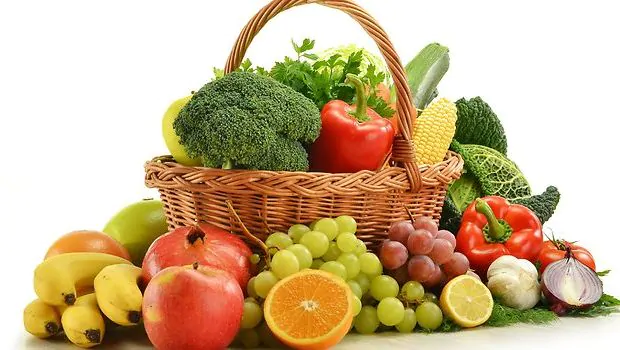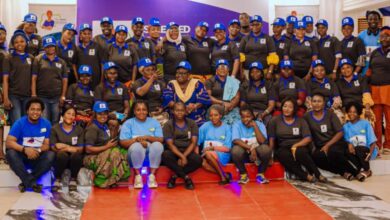Enhancing Nutritional Levels To Achieve Sustainable Growth

BY EDET UDOH
Experts have identified Adequate nutrition and good health as critical to achieving the 17 Sustainable Development Goals (SDGs), emphasising the need for all to be in good health to be actively involved in all the activities leading to the success of the goals.
This article highlights experts’ views on the relationship between nutrition and national growth; identifying the causes of malnutrition and the need to fight against it, as well as what Nestle, the Good Food, Good Life Company is doing to ensure good health for all now and in future.
The Sustainable Development Goals (SDGs), also known as the Global Goals, were adopted by the United Nations in 2015 as a universal call to action to end poverty, protect the planet, and ensure that by 2030 all people enjoy peace and prosperity.
The 17 SDGs are integrated—they recognise that action in one area will affect outcomes in others and that development must balance social, economic and environmental sustainability.
The Goals are: Goal 1: End poverty in all its forms everywhere; Goal 2: End hunger, achieve food security and improved nutrition and promote sustainable agriculture; Goal 3: Ensure healthy lives and promote well-being for all at all ages; Goal 4: Quality Education; Goal 5: Gender Equality; Goal 6: Ensure availability and sustainable management of water and sanitation for all; Goal 7: Ensure access to affordable, reliable, sustainable and modern energy for all; Goal 8: Promote sustained, inclusive and sustainable economic growth, full and productive employment and decent work for all; Goal 9: Build resilient infrastructure, promote inclusive and sustainable industrialization and foster innovation.
Other SDGs are Goal 10: Reduce inequality within and among countries; Goal 11: Make cities and human settlements inclusive, safe, resilient and sustainable; Goal 12: Ensure sustainable consumption and production patterns; Goal 13: Take urgent action to combat climate change and its impacts; Goal 14: Conserve and sustainably use the oceans, seas and marine resources for sustainable development; Goal 15: Goal 16: Promote peaceful and inclusive societies for sustainable development, provide access to justice for all and build effective, accountable and inclusive institutions at all levels and Goal 17: Strengthen the means of implementation and revitalize the global partnership for sustainable development.
The SDGs are designed to end some of these issues: poverty, hunger, and AIDS, promote peaceful and inclusive societal goals, provide access to justice, ensure sustainable consumption and production patterns; take action to combat climate change and its impacts; conserve and sustainably use oceans, seas and marine resource; reduce inequality within among countries; Ensure access to affordable, reliable, sustainable and modern energy for all; Promote sustained, inclusive and sustainable economic growth, full and productive employment and decent work for all; Build resilient infrastructure, promote inclusive and sustainable industrialization and foster innovation as well end discrimination against women and girls.
Experts believe that adequate nutrition enhances healthy living and is key to achieving the above-stated SDGs, adding that there is a need to fight against malnutrition.
Causes of Malnutrition
Findings have shown that in 2023, over 20 million more people will be hungry in Africa a fifth of the African population (278m) is malnourished, and 55 million of its children under the age of five are stunted due to severe malnutrition.
This results from inadequate political choices coupled with global inflation and climate disasters because of failure on the side of African leaders to live up to their responsibilities.
According to OXFAM International, ”the chronic underinvestment in agriculture is a key cause of the widespread hunger experienced in 2022. The majority of African governments (48 out of 54) reportedly spend an average of 3.8 percent of their budgets on agriculture -some spending as little as one percent. Nearly three-quarters of these governments have reduced their agricultural spending since 2019, failing to honour their Malabo commitments to invest at least 10% of their budget on agriculture.”
Malabo Declaration
At the African Union (AU) Summit in Malabo, Equatorial Guinea in June 2014, Heads of State and Government adopted a remarkable set of concrete agriculture goals to be attained by 2025.
The Malabo Declaration on Accelerated Agricultural Growth and Transformation for Shared Prosperity and Improved Livelihoods is a set of new goals showing a more targeted approach to achieve the agricultural vision for the continent which is shared prosperity and improved livelihoods.
The Malabo Summit reconfirmed that agriculture should remain high on the development agenda of the continent, and is a critical policy initiative for African economic growth and poverty reduction.
In 2022 alone, food inflation rose by double digits in all but ten African countries thereby reducing people’s purchasing power while many are impoverished and starved as a result of the inability to go to farm because of insecurity thereby fuelling hunger and malnutrition.
Although Nestle has promoted many laudable initiatives and invested heavily in many programmes such as Agriprenuer Webinar, Small Holding Farming, Regenerative Agriculture, among others to boost food sufficiency and ensure environment sustainability, and it was based on the need to fight against malnutrition and improve nutritional levels, that Nestle introduced food fortification strategy as an interventional mechanism to ensure a healthy living for all.

Fortification As a Strategy to Improve Nutrition
In her presentation titled “Malnutrition in Nigeria – Fortification as Strategy for Improving Nutrition Indices,” at a Capacity Building Workshop organised by Nestle Nigeria for Journalists in Lagos, Dr. Kanalio Olaloku of the Nestle Nutrition Institute Central West African Region, highlighted why food fortification and supplementation remain the key sources for improving nutrition indices, just as she said there is a wide range of other interventions to tackle micronutrient inadequacies.
“Micronutrients are vitamins and minerals needed by the body in very small amounts, their impact on a body’s health is critical, as deficiency in any of them can cause severe and even life-threatening conditions.
“Micronutrient deficiencies have been an enduring problem in Nigeria, and the prevalence of Vitamin A deficiency is estimated at 30 per cent and 70 per cent of children are anaemic,” Dr Olaloku explained.
She said deficiencies in iron, Vitamin A and iodine are the most common around the world, particularly in children and pregnant women, adding that “People in developing countries are far more likely to live in social and economic situations that exacerbate anaemia such as pregnant women, infants, and pre-school children. In Africa, 50 per cent and 40 per cent of pregnant women and pre-school children respectively are estimated to be anaemic.”
Fight against Malnutrition
Speaking at stream one of the training programmes jointly organised by Nestle Nigeria and the Lagos Business School Sustainability Centre, for journalists covering, Health/Nutrition, Agriculture, Environment and Business/Economy on the topic “Exploring the Burden of Nutrition in Africa: Micronutrient Fortification and Other Solutions 1,” Manager, Nestle Nutrition Institute, Central and West Africa, Dr Kanalio Olaloku, emphasised the need to fight against malnutrition in Nigeria and Africa as a whole.
Expert said the Company is working assiduously to increase awareness of the importance of iron, the severe impact of Iron Deficiency Anemia, and the affordable and accessible solution in collaborative partnership with stakeholders namely: the Federal Ministry of Health (FMH), Federal Ministry of Agriculture and Rural Development (FMARD) and the Federal Ministry of Education (FME) to drive advocacy for better eating choices.
She said the firm is also involved in educating and training Health Care Professionals on practical interventions to reduce malnutrition, noting that 83 per cent of the regions have recorded a 49 per cent decrease in malnutrition.
According to Dr. Olaloku “There is a wide range of interventions available to tackle micronutrient inadequacies which are the major cause of malnutrition. For the long term, interventions aimed at increasing dietary diversification should be the central component of micronutrient deficiency prevention and control efforts.
“It must be recognized that these interventions will take time to show impact, and they might not provide the required amounts of all nutrients needed throughout the lifecycle. Until populations’ diets improve, and to meet the deficiencies that longer-term intervention will correct, food fortification and supplementation remain the primary sources for delivering key micronutrients to all risk populations.”
Food fortification, according to her, “Is the practice of deliberately increasing the content of one or more micronutrients (i.e., vitamins and minerals) in a food or condiment to improve the nutritional quality of the food supply and provide a public health benefit with minimal health risk as well as increasing the nutritional content of staple foods, the addition of micronutrients can help to restore the micronutrient content lost during processing.”
On why food fortification is the best option for boosting micronutrients, Dr Kanalio said “Food fortification is widely identified as a cost-effective strategy for addressing micronutrient malnutrition at scale. Food fortification with a focus on vitamin A, Iron, zinc, iodine, and other micronutrients remains a major thrust of the effort to eliminate micronutrient malnutrition.”
Nutrition and National Growth
Speaking during Nestle’s Live Strong with Iron launch in Abuja, Dr Binyerem Ukaire, Director and Head of the Nutrition Department who represented the then Minister of Health, Federal Ministry of Health, Dr Osagie Ehanire, in her presentation titled “National Perspective on Iron Deficiency” emphasized the need for consumption of iron-rich local foods for enhancement of healthy living, especially by the local dwellers.
While giving insights into the causes of iron deficiency, she also explained the consequences of the problems, and what the government is doing in terms of policy and programmes, interventions and recommendations.
“Adequate nutrition is very key to the growth of any country. When we say adequate nutrition, we mean what will make all Nigerians well-nourished because we believe that adequate nutrition is the bedrock for good health, for achieving all the sustainable development goals, especially goals number two and three. It is the bedrock for physical growth and development, in the child and even later on for productivity and also for economic growth. When we talk about adequate nutrition, we are talking about the quantity, the quality of what is being consumed concerning micronutrients – your fat, your carbohydrate etc.
“We are gathered here today because iron is very crucial. When you say haemoglobin you refer to iron. Iron is very vital for the synthesis of haemoglobin in the red blood cell and we all know that blood is life and survival,” Dr. Ukaire added.
Need for Government/Multi-Sectorial Partnership
On the need for private-government partnerships in providing various interventions, Dr. Olaloku said, “We have a wide array of interventions and for the long-term intervention, increasing dietary specification should be the central component, especially when looking at prevention and control efforts. In this case, the government, regulatory bodies and stakeholders have a crucial role. We must recognise that this intervention will take time to show impact because it’s not a one-day or one-month affair.
“If we are talking about achieving the global sustainable development goals (SDGs) as well as ending hunger by 2030, these interventions, according to her, are something that needs very high consideration. Until the population diet is improved, and for the deficiency to be corrected, food fortification and supplication with capsules remain the primary sources for delivering the key micronutrients to our population.”
She noted, “The government has a big role to play by regulating the food manufacturers because sometimes you may find out that the nutrients they claimed are in the food products may or may not be present.”
She also identified the importance of Research and data, adding that “Research and data is another critical aspect. This is also making sure that we do appropriate Research with the key stakeholders to identify where the problems are and see what we can do as regards fortification.
“Again, we need a multi-sectoral approach to achieve the interventions. Government must be the number one; the private companies as well. We also have stakeholders in the educational sector to introduce how to inculcate nutrition into children’s education curriculum. So the Ministry of Health, the Education Ministry, the Ministry of Agriculture, the Nigerian Youth Service Corps as well as other stakeholders in the Nigerian health system should help us as a nation combat micronutrient deficiency,” Dr Kanalio pleaded.
Innovative Products/Need for Awareness
Nestle, the Good Food, Good Life Company, in its practical demonstration to ensure a good life for all now and in future aimed at achieving the SDGs has continued to introduce various initiatives to ensure that all food produced by the company is fortified with iron.
The Journal of Public Health in Africa stated that the prevalence of anemia among school-age children in Nigeria is 71% and among women, 47.3%.
As part of efforts to mitigate the effects of malnutrition, nutrition-focused company, Nestlé has, over the years, been championing the drive to meet the nutritional needs of the continent through innovative products such as Golden Morn, Nan, Lactogen, Nutrend, NIDO, and Cerelac, just to mention a few. these are some of the familiar household names.
Speaking at one of Nestle Nigeria’s events in Lagos, the Corporate Communication and Public Affairs Manager, Mrs. Victoria Uwadoka, who represented the Managing Director/Chief Executive Officer, Wassim El-Husseini, emphasised the importance of eating good food and the place of good health in the growth of any nation.
She noted that we have many local sources of iron-rich foods but many people are unaware of their nutritional values, adding that the Live Strong with Iron campaign aims to create awareness, educate the public and draw their attention to the inherent benefits of eating our local iron-rich food and iron-fortified foods.
According to her, “We have all these readily available but do the people know that they contain iron. Do they know how to combine it? Do they know how to eat it? Do they know whether their body is absorbing it or not? We need stakeholders’ action to frame this problem, call for a solution, and help our people make the right nutrition choices so that if we were to conduct a survey, the metric would be so much better, which is what we are looking forward to, as we work towards achieving the global SDGs.’’
Affordable Fortified Dairies
According to Nestlé, the latest addition to its nutrition portfolio, NIDO Milk & Soya Instant Powder Mix, provides protein from valuable sources and also addresses Iron deficiency which is currently one of the major micro-nutrient deficiencies in Nigeria.
Commenting on the new product, Victoria Uwadoka, Corporate Communications, Public Affairs and Sustainability lead at Nestlé Nigeria said, “This product is made from Milk and Soya, fortified with Iron and Vitamin C.
“Not only do we get protein from 2 valuable sources, we also address Iron deficiency which is one of the major micro-nutrient deficiencies in Nigeria today.
“The product is a culmination of many months of hard and relentless work, from creating and testing the right recipe to initiating the unique technology employed to manufacture the product.
She added “Except for infants, the new product is suitable for all members of the family.
“For over 62 years, Nestlé has been part of the daily nutrition of millions of households in Nigeria, by consistently using its research and development capabilities to unlock the power of food to enhance the well-being of individuals and families.
According to Ifeanyi Orabuche, the Category & Marketing Manager of dairy, “NIDO Milk & Soya is our first affordable fortified dairy and plant blend in the Nigerian market.
“This unique blend of filled milk and soya is a source of Iron and has other essential nutrients including Protein, Calcium, Vitamin C, and dietary fibre which support digestion.
“NIDO Milk & Soya joins our portfolio of fortified products to help address the high rate of micronutrient deficiency, especially of Iron in the country.”
According to Nestlé, NIDO Milk & Soya Instant Powder Mix was developed by local experts in Nestlé’s R&D Center in Abidjan and is produced locally in Nigeria using 100% locally sourced soybeans.
“It is a result of Nestlé’s progress in product innovation and renovation to meet the growing consumer demand for affordable nutrition options that also create societal value.
“At Nestlé, our decisions are guided by our purpose of unlocking the power of food to enhance the quality of life for everyone today and for future generations.
“With this new product, we are helping to sustain a steady source of revenue to improve the livelihoods of the local farmers who supply the soybeans used in the production of NIDO Milk & Soya,” said Victoria Uwadoka,
“This launch is part of Nestlé Nigeria’s ongoing commitment to offering affordable, wholesome and nutritious options for consumers across the country while providing long-term benefits that are good for individuals and families, good for communities and good for the planet.
“The new product will expand the offering within our ambient dairy portfolio. The total milk category in Nigeria is worth over 300 Bio so as we drive recruitment, this allows us to capture a share of this huge opportunity,” she added.
Solution and Way Forward To Tackle Malnutrition
Experts at Nestle advocated eating right, the need to ensure access to affordable and availability of nutritious food; food fortification and supplementation; regular deworming; dietary diversification; enhanced caregiver capability; multi-sectoral approach/partnership; continued research/data availability and the need for the media to play its roles as one of the critical stakeholders in the campaign against malnutrition that will ensure the well being of all for the achievement of the SDGs.





